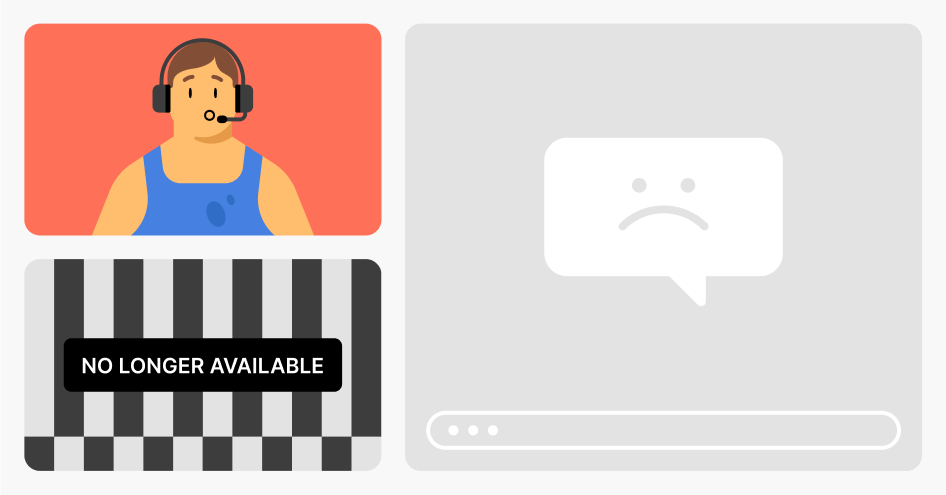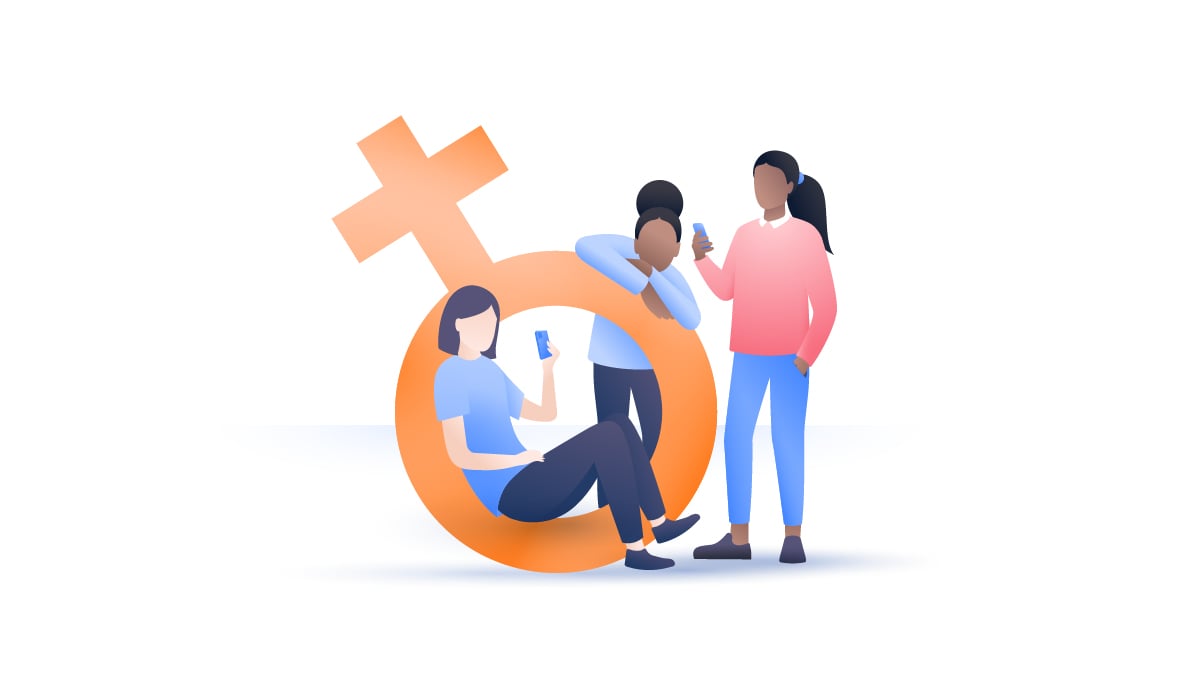Is Omegle safe? Everything you need to know
For 14 years, the roulette-style chat app Omegle let you socialize with strangers. Even though Omegle is now closed, people are still wondering if it was safe and if they potentially compromised their online privacy while using it. Let us take you through how the platform used to work, what dangers it might have posed, and how to stay safe on apps like Omegle.

Table of Contents
Table of Contents
What is Omegle?
Omegle was an anonymous, real-time text and video chat platform and app that paired random users from all over the world for one-on-one chat sessions. The platform was closed in November 2023.
In January 2023, Omegle’s monthly traffic exceeded 70 million visits, proving its lasting popularity since its launch in 2009. The platform was predominantly visited by young adults (18-24 years old), but children, as young as seven or eight years old, were also using it.
So what happened to this popular platform and why was Omegle closed?
What happened to Omegle?
The growing legal and ethical concerns for minors’ safety contributed to Omegle’s closure in November 2023. Omegle was mentioned in over 50 cases against child abusers as a platform that’s easy to abuse for illegal purposes.
The culminating factor to Omegle’s shutdown was a lawsuit filed by a young American who suffered sexual abuse on the platform. She accused Omegle of facilitating child sexual abuse and failing to implement adequate moderation and safety measures. The lawsuit resulted in Omegle paying a $22 million settlement and permanently ceasing operations.
Was Omegle safe?
Yes, Omegle might have been unsafe, especially for young adults and children. The platform lacked user registration or verification procedures and age verification procedures. You didn’t have to provide an email address or any other form of identification to join the chat rooms, unless you wanted to enter the college student chat section. This anonymous nature made Omegle an excellent breeding ground for online predators and cybercriminals.
It was also possible for the other user to take screenshots or record and even broadcast your video chats using third-party software, leading to blackmail and cyberbullying.
Was Omegle safe for children?
Omegle was risky to use for children because they could have become exposed to inappropriate content or entered a chat with someone with malicious intentions. Since there were no parental control settings on Omegle, children were left to their own devices.
Like most social media sites, Omegle had a minimum age limit of 13 years with parental permission. Users had to be 18 or older to not require parental permission, while the unmoderated chat section on Omegle was intended for users aged 18 and older. Despite these guidelines, the site did not require users to verify their age, which meant that compliance with these guidelines was not enforced in any way, making it very easy for underage users to join adult chat rooms.
Unsupervised children could end up in a chatroom with a predator on Omegle. They could be exposed to harmful content or abused verbally. Abuse, sexual harassment, and cyberbullying were among the risks that minors faced on Omegle. Falling prey to phishing scams and revealing personal information was also a threat for younger users.
In its Community Guidelines, Omegle stated that any content and conduct endangering minors was strictly prohibited all over the site and would be sent to appropriate law enforcement agencies.
Dangers on Omegle
Omegle used to pose several dangers for kids and adults alike. Let’s look at them one by one.
Online predators
Sexual predators were known to use Omegle. The anonymous nature of this chat platform made it easy for them to take advantage of unsuspecting children.
Exposure to inappropriate content
The lack of age verification procedures on Omegle used to pose a risk for users, especially children and teenagers, to accidentally come across or be intentionally exposed to harmful content, such as nudity or sexually explicit content.
Little accountability and partial moderation
Omegle allowed people to use its services without providing their email or any other form of authentication. This meant that users could behave in any way they liked in the chats without accountability.
However, you could report users to Omegle for hateful conduct or harassment in both moderated and unmoderated chats. But nudity and sexually explicit conduct and content was only prohibited in the moderated chats. The site moderators would sometimes temporarily or permanently ban the user based on the severity of their offense.
Stalking, blackmail, and cyberbullying
Cybercriminals could take screenshots of your text conversations or record video chats on Omegle without your knowledge. Then they could start stalking or blackmailing you if you’d ever shared any personal information with them that could’ve revealed your identity or allowed the criminals to track you down.
Omegle’s open chat system, devoid of user accountability, also provided a favorable environment for cyber bullies who attacked others with hurtful or aggressive messages.
Data retention
Omegle would retain some of your data like chat logs, online identifiers, and IP addresses for 120 days, unless it was necessary to retain it for longer to fulfill the purposes required by law.
However, Omegle would retain its “Saved chatlogs” indefinitely. Users could choose to save the chat log at the end of their session. This saved chat log would contain all the information the user shared with another user.
Here is the list of user information that Omegle would store and share with its service providers for improving its services and moderating chats:
- IP address.
- ID cookies assigned to the user when they log in.
- College domain name if you used college mode.
- Browsing history, search history, data on the user’s interaction with the website or ads.
- Geolocation data.
- Snapshots of video stream chats.
Omegle would not knowingly collect personal information from children under the age of 18. Parents who believed their child under 18 provided personal information on Omegle had the possibility of contacting Omegle’s privacy team and asking them to remove it. Here is Omegle’s privacy notice for more information on their data retention practices.
Hacking
Was Omegle safe from hackers? As with any social media site, the answer is no. Hackers could enter Omegle’s chats and share malicious links with other users to trick them into clicking on them and accessing malicious websites. They might have also applied social engineering tactics to manipulate other users into disclosing personal details.
You should never provide your personal data on apps and platforms like Omegle because a cybercriminal might pair it with your screenshots and photos and piece together your identity, which could lead to identity theft.
How to be safe on apps like Omegle
If you are keen on using apps or platforms similar to Omegle, check out our tips on how to avoid online threats and stay safe:
- Report inappropriate users. If you’ve experienced online abuse or any other form of inappropriate verbal or visual attack from another user, report them to app administrators to have them banned. And leave the conversation immediately to protect yourself.
- Avoid suspicious links and ads. Avoid clicking malicious links or ads that other users share because they might lead you to malicious websites or infect your device with malware. And never download files from strangers.
- Do not share private data. You never know who you’re chatting with online, especially not on apps that support anonymity. If the person on the other side of the screen is a criminal, they could use your information for their own gain.
- Use a VPN. A VPN will increase your online privacy by masking your actual IP address, making it much harder for the platform or malicious users to pinpoint your virtual location. NordVPN’s Threat Protection Pro feature also helps to avoid some online threats by blocking malicious websites, preventing you from accidentally entering them.

